Choosing the right online forex broker is crucial for anyone looking to delve into the world of online trading. The forex market, with its global reach and around-the-clock trading, offers a plethora of opportunities for traders. However, not all online forex brokers are created equal. To ensure success in your online trading journey, it’s essential to choose the best online forex broker that aligns with your trading style, goals, and risk tolerance. Here are some key factors to consider when making your decision.
Regulation and Reputation Your online forex broker should be regulated by a reputable financial authority. Regulation ensures that the broker adheres to strict standards of conduct, including transparency, fair dealing, and financial stability. Look for brokers regulated by bodies such as the Financial Conduct Authority (FCA) in the UK, the Commodity Futures Trading Commission (CFTC) in the US, or the Australian Securities and Investments Commission (ASIC). Additionally, a broker’s reputation can be gauged by its history, customer reviews, and any awards it may have received. A well-regarded broker is more likely to provide a secure and reliable trading environment.
Trading Platform and Tools The trading platform is the heart of your online forex experience. It should be user-friendly, feature-rich, and offer a wide range of tools to help you make informed trading decisions. Look for platforms that support multiple devices, including desktops, laptops, tablets, and smartphones, allowing you to trade on the go. Advanced charting tools, a variety of technical indicators, and customizable layouts are also important features to consider. Some brokers may offer their proprietary platforms, while others may use popular third-party platforms like MetaTrader 4 or MetaTrader 5.
Spreads and Commissions In online forex trading, spreads are the difference between the bid and ask prices of a currency pair. A tight spread can significantly impact your trading profitability, especially for day traders who make many transactions. While lower spreads are generally better, be wary of brokers offering spreads that seem too good to be true, as they may come with hidden fees or commissions. Some brokers operate on a no-commission model, while others charge a fixed fee per trade. It’s important to understand the cost structure of your broker to avoid any surprises.
Leverage and Margin Leverage is a double-edged sword in online forex trading. It can amplify your profits but also your losses. Most brokers offer leverage ratios ranging from 50:1 to 500:1. However, higher leverage doesn’t always mean better. It’s crucial to understand how leverage works and to use it responsibly. Margin requirements are also an important factor to consider, as they determine how much capital you need to hold in your account to maintain open positions. Different brokers may have different margin requirements, so it’s essential to find one that fits your trading strategy and risk management plan.
Customer Support Access to reliable customer support is vital, especially when you encounter issues with your trades or the trading platform. Look for brokers that offer 24/5 support, as the forex market operates 24 hours a day, five days a week. Support should be available through various channels, including phone, email, and live chat. Quick response times and knowledgeable support staff can make a significant difference in your trading experience.
Educational Resources and Research For many traders, especially beginners, educational resources and research materials are invaluable. A good online forex broker should offer a range of educational content, from beginner’s guides to advanced trading strategies. Look for brokers that provide daily market analysis, economic calendars, webinars, and video tutorials. These resources can help you improve your trading skills and make more informed decisions.
Security and Fund Safety The security of your funds is paramount. Ensure that your online forex broker segregates client funds from company funds and holds them in trusted financial institutions. Additionally, look for brokers that offer negative balance protection, which ensures you won’t owe the broker money if your account goes into a negative balance due to market movements. Regular financial audits and the use of encryption technology for data protection are also signs of a secure broker.
Scalping and Algorithmic Trading Policies Some traders prefer scalping, which involves making many trades in a short period to capitalize on small price movements. Other traders may use algorithmic or automated trading strategies. It’s important to choose an online forex broker that supports your preferred trading style. Some brokers may have restrictions or additional fees for scalping or algorithmic trading, so it’s crucial to understand their policies before you start trading.
Account Types and Features Different brokers offer different types of accounts, each with its own set of features and benefits. Standard accounts may have higher spreads but no commissions, while premium accounts may offer lower spreads and additional benefits like dedicated account managers or priority execution. Consider your trading needs and choose an account type that offers the features you require without unnecessary costs.
Conclusion Choosing the best online forex broker is a personal decision that requires careful consideration of various factors. By evaluating regulation, trading platforms, costs, leverage, customer support, educational resources, security, trading policies, and account types, you can find an online forex broker that meets your specific needs and helps you achieve your online trading goals. Remember, the right broker can make a significant difference in your trading success.





